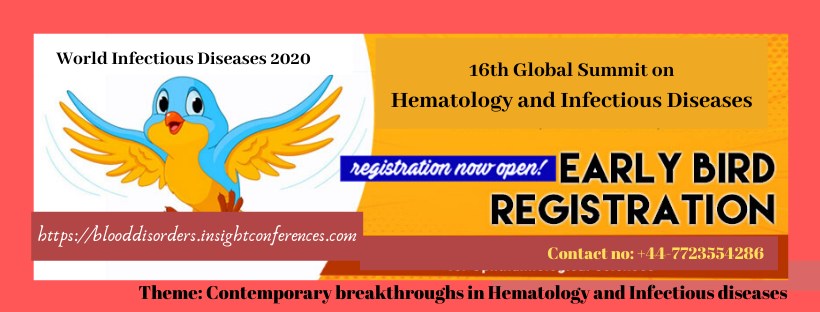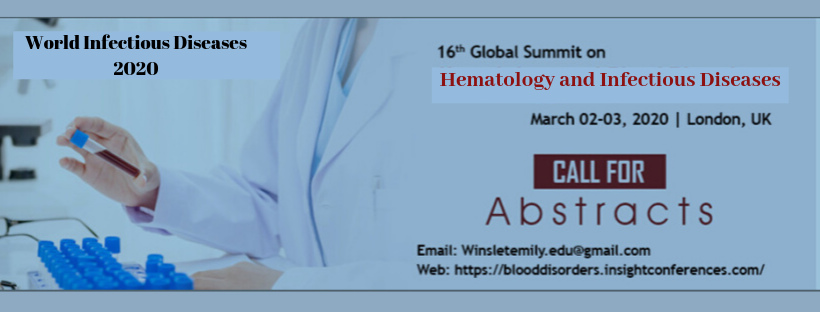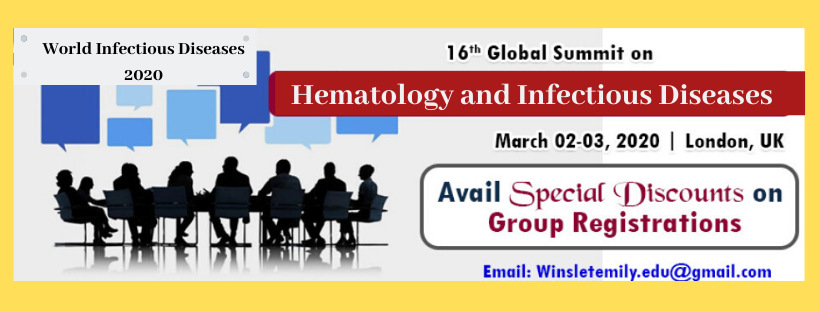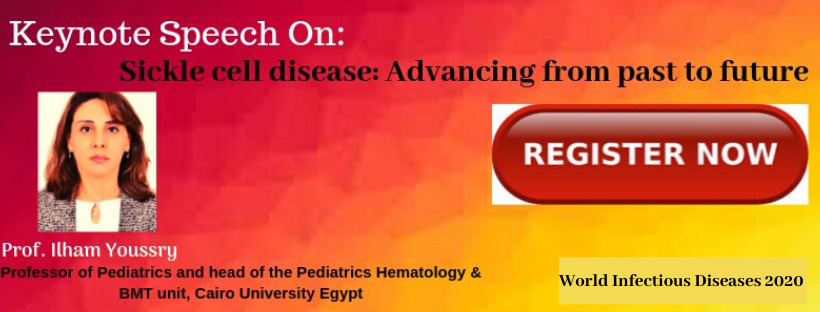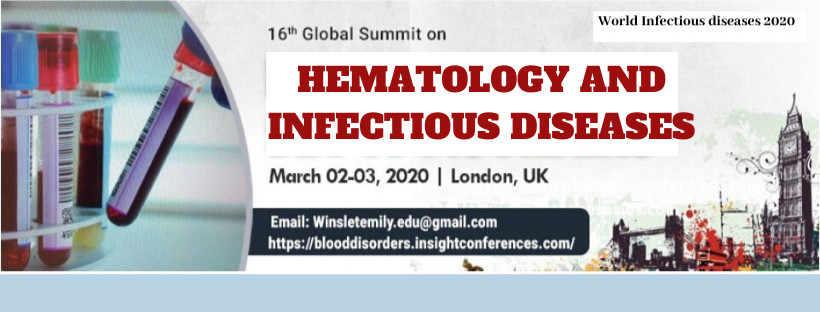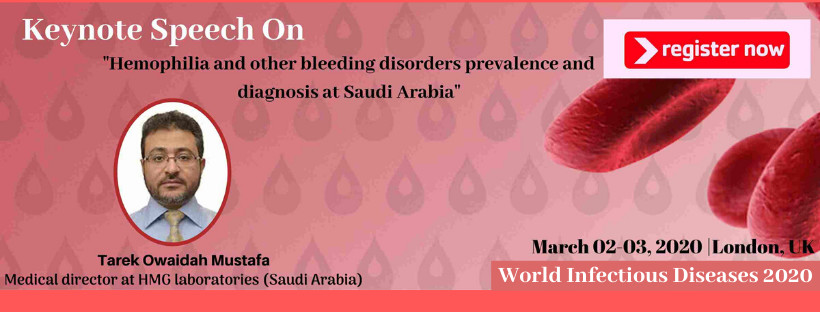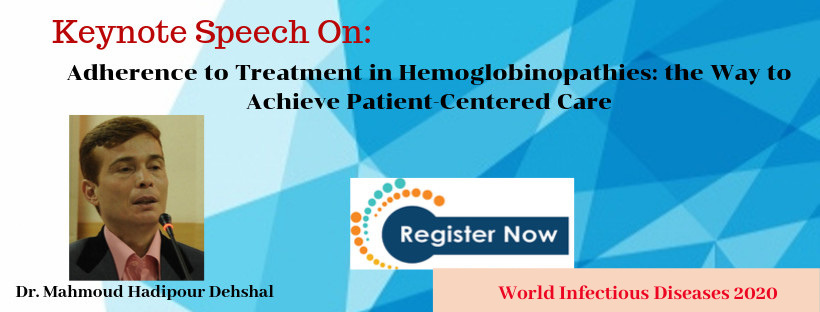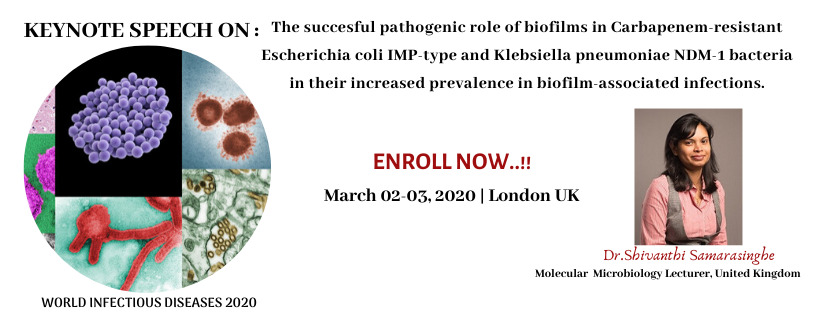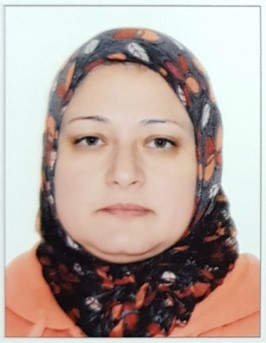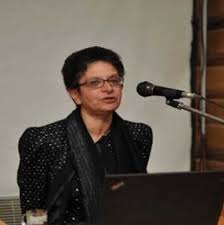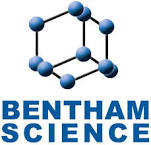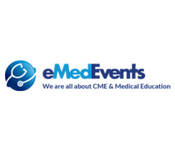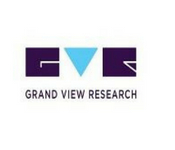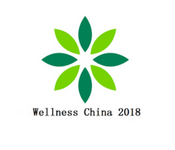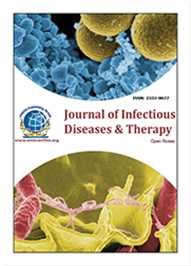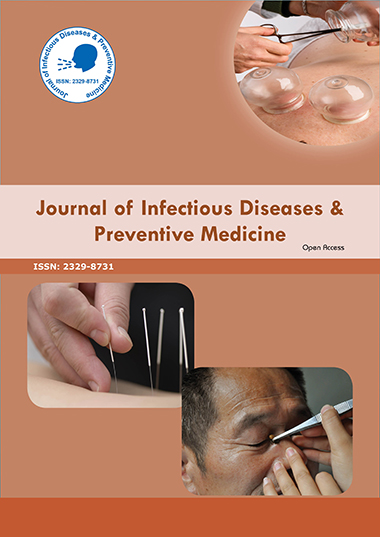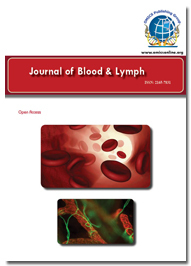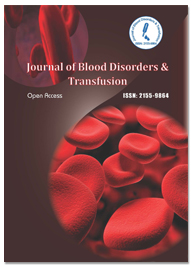Theme:
World Infectious Diseases 2020
- ABOUT CONFERENCE
- SESSION TRACKS
- MARKET ANALYSIS
- ABSTRACT DEADLINES
- PARTICIPATION OPTION AND BENEFITS
- Participation and Benefits
World Infectious Diseases 2020 committee, we are pleased to invite you to join the upcoming “16th Global Summit on Hematology and Infectious Diseases” to be held during March 02-03, 2020 in London | UK.
World Infectious Diseases 2020 has been planning and aiming to stimulate new techniques for the treatment of Infectious Diseases like: Cancer, Hematologic malignancies, Blood diseases, HIV, https://blooddisorders.insightconferences.com/STDs and many more..
Hematology is the discipline concerned with the production, functions, bone marrow, and diseases which are related to blood, blood proteins. The main aim of this conference is to bring Hematologists, Medical professors, Immunologists, Pathologists and scientific researchers. Blood Disorders can affect one or more parts of the blood and prevent blood from doing its functions. They may be acute or chronic. Some Blood disorders are inherited, and some are due to lack of certain nutrients in our diet and one of the reasons for blood disorder can be medicine.
Infectious diseases are disorder caused by the unfold of microorganisms like viruses, bacteria, fungi or parasites. Infectious diseases are also of food borne, water borne, vector borne, air borne in human beings and also as animals and plants. Infectious diseases measured 4-membered of all deaths, dimensional of all potential life years lost and eight of bed days. Infections unit guilty for illness absence from work like minor sicknesses like metabolism or gastro-intestinal infections that unit the foremost common reason for work absence, in 2013, 7.6% of economic burden from infectious diseases in European country is estimable at £30bn annually.
Realizing this imperative, we tend to organize World Infectious diseases 2020 in London, Associate in Nursing with an agenda to stimulate and support the adoption of effective measures for the police work, prevention and control of Infectious diseases.
SCOPE
Common blood related disorders include Leukemia, Anemia, Bleeding, Clotting and Myeloma. Blood disorders mainly affect blood components such as White blood cells, Red blood cells, and Platelets.
Yearly, about 1.2 million Americans develop blood clots in veins of the leg. Approx. 40% of the Americans suffering from Blood related disorders in a year. About 10 percent of people with blood clots die from pulmonary embolism (PE), Von Willebrand disease is the most common blood disorder, affecting 0.6 percent to 1.3 percent of the general population and Hemophilia is a genetic disorder that passes from a mother to its male offspring, affects males and causes a deficiency of proteins needed for normal blood clotting.
WHY TO ATTEND?
World Infectious Diseases 2020 will provide a scientific environment and a platform for the participants to exchange ideas, establish research collaboration and networking. With members from around the world focused on learning about Leukemia, Hemophilia, Blood clotting and Hematologic Oncology; this is your best opportunity to reach the largest assemblage of participants from the cancer community to fight against these hard to cure blood diseases and cancer.
CONFERENCE OPPORTUNITIES
For Researchers and Faculty Members:
Speaker Presentations
Poster Display
Symposium hosting (4-5 members/team)
Workshop organizing
For Universities, Associations & Societies:
Association Partnering
Collaboration Proposals
Academic Partnering
Group Participation
For Students and Research Scholars:
Poster Competition (Winner will get Best Poster Award)
Young Researcher Forum (YRF Award to the best presenter) For Business Delegates:
Speaker Presentations
Symposium hosting
Book Launch event
Networking opportunities
Audience participation
For Product Manufacturers:
Exhibitor and Vendor Booths
Sponsorships opportunities
Product launch Workshop organizing
Scientific Partnering
Marketing and Networking with clients
Benefits
Best Poster Award:
Outstanding Young Researcher Award
Group Registration benefits
Keynote sessions by the world’s most eminent researchers
Top Industries Representations
TARGET OF AUDIENCE
Directors/Managers/CEO's Presidents & Vice Presidents
Track 01: Hematology
The word Heme came from Greek which means blood. Hematology involves the diagnosis and treatment of patients who have disorders of the blood and bone marrow. It is mainly responsible for the diagnosis of benign and malignant disorders of the red and white blood cells, platelets and the coagulation system in adults and children. Blood disorders are conditions that impact the blood's ability to function correctly; their patients may have a serious life- threatening illness such as leukemia, lymphoma or myeloma that requires chemotherapy.
Physicians who work on treating hematologic disorders, referred to as Hematologists. Hematologists as well hematopathologists both work in conjugation for giving the best therapy.
Sub- tracks:
Related Conference: Hematology and Oncology
Keywords: Infectious Diseases Conferences | Hematology Conference | Blood Diseases Conferences | Blood Disorders Conference | Hematology Congress | Hematology Disorders Conference | Infection Conference | Microbiology Conference | Hematology Nursing Conference | Autism Conference | Blood Conference|
Track 2: Infectious Diseases & Agents
Infectious diseases are caused by the pathogenic organisms by viruses, bacteria and fungus. Microorganisms present inside the host body are safe normally, under specific conditions become fatal and causes death. Symptoms, inflammation, high fever and immune response results due to pathogens that cause infection by disrupting the host body normal process. Infectious diseases kill a lot of individuals worldwide than the other single cause. Infectious diseases are caused by germs. Germs are little living things that are found all over - in air, soil and water. you'll get infected by touching, eating, drinking or respiratory one thing that contains a germ. Germs may unfold through animal and bug bites, petting and sexual contact. Vaccines, correct hand laundry and medicines will facilitate forestall infections.
Keywords: Infectious Diseases Conferences | Infectious Diseases Meeting | Microbiology Conferences | Infectious Diseases Event | Bacteriology Conferences | Emerging Infectious Diseases Conferences | Clinical Microbiology Conferences | Infection Prevention Conferences | International Congress on Infectious Diseases | Global Experts Meeting on Infectious Diseases |
Track 3: Bacteria & Fungal Infectious Diseases
Bacteria unit of measurement non cellular microorganisms in addition referred to as prokaryotes. There unit of measurement denumerable to be a minimum of nonnonillion bacteria on our planet. A nonillion means one followed by thirty zeros. Example of Earth's biomass is made from bacteria exclusively. Many plant life infections seem on the higher layers of the skin, and a few achieve the deeper layers likewise. Breathing plant life spores may also result in general plant life infections, like thrush, or mycosis,
Keywords: Bone marrow transplantation meetings | American stem cells conferences 2020 | Infectious Diseases conferences | Clinical blood pathology conferences | Immuno- oncology conferences | Infectious Diseases Workshops
Track 4: Global Trends in Emerging Infectious Diseases
An Infectious disease incidence has inflated quickly within the past few decades or threatens to extend is termed as rising. These diseases embrace new infections, an decadently unrecognized infections and recent infections reappearing because of antimicrobial resistance, public health problems and unsanitary conditions.
Keywords: Infectious Diseases Conferences | Hematology Conference | Blood Diseases Conferences | Blood Disorders Conference | Hematology Congress | Hematology Disorders Conference | Infection Conference | Microbiology Conference | Hematology Nursing Conference | Autism Conference | Blood Conference|
Track 5: Blood- Components and Functions
The blood contains of the erythrocytes, leukocytes, Red blood cells, White blood cells, Complete blood count, plasma cells, and platelets. Sometimes when the blood of two people is mixed together, it clumps or forms visible islands in the liquid plasma--the red cells become attached to one another this is agglutination which results in formation of fibrins. Erythrocytes are also known as red blood cells which carry oxygen to the body and collect carbon dioxide from the body by the use of hemoglobin and its life span of 120 days. Along the side the leucocytes help in protecting the healthy cells because the white blood cells (leucocytes) act as the defending cells in protecting the immune system from the foreign cells.
Sub- tracks:
Related Conference: Hematology and Oncology
Keywords: Infectious Diseases Conferences | Hematology Conference | Blood Diseases Conferences | Blood Disorders Conference | Hematology Congress | Hematology Disorders Conference | Infection Conference | Microbiology Conference | Hematology Nursing Conference | Autism Conference | Blood Conference|
Track 6: Blood disorders
Blood disorders affect one or more parts of the blood and prevent your blood from doing its job. They can be acute or chronic. Many blood disorders are inherited. Other causes include other diseases, side effects of medicines, and a lack of certain nutrients in your diet.
Sub- tracks:
- Anemia
Anemia is a condition in which you don't have enough healthy red blood cells to carry adequate oxygen to the body's tissues. Having Anemia may make you feel tired and weak. There are many forms of Anemia, each with its own cause. Anemia can be temporary or long term, and it can range from mild to severe. This occurs due to following reasons-
1. Iron deficiency and impaired immunity
2. Iron and pathogens
3. Causes of Anemia
4. Risk factors
5. Nutritional Anemia
6. Stages of anemia
- Myeloma
Myeloma, also known as multiple myeloma, it can be benign and malignant, is a blood cancer arising from plasma cells. At any one time there are around 17,500 people living with myeloma in the UK. It accounts for 15 per cent of blood cancers, and two per cent of all cancers. Myeloma mainly affects those over the age of 65, however it has been diagnosed in people as young as 20. This occurs due to following reasons-
1. Multiple Myeloma
2. Signal Transduction
3. Metastatic Cancer
5. Signaling Pathway
6. Information on Drugs
7. Medicine for Inflammation
- Coagulopathies
Coagulopathy is a condition in which the blood's ability to coagulate (form clots) is impaired. This condition can cause a tendency toward prolonged or excessive bleeding, which may occur spontaneously or following an injury or medical and dental procedures. This occurs due to following reasons-
1. Thrombocytopenia
2. Qualitative Platelet Disorders
3. Inherited Thrombocytopenia
5. Coagulopathy of liver disease
6. drug-induced platelet dysfunction
7. Acquired clotting factor inhibitors
8. Hemophilia A
9. Hemophilia B
- Leukemia
Leukemia is a cancer which starts in blood-forming tissue, usually the bone marrow. It leads to the over-production of abnormal white blood cells, the part of the immune system which defends the body against infection. This occurs due to following reasons-
1. Oncogene
2. Pancreatic and Colorectal Cancer
3. Gynecologic Oncology
4. Melanoma and Carcinoma
5. Molecular & Cancer Biomarkers
6. Leukemia and Bone marrow Transplantation
7. Neoplasms
8. Biomedical Research
- Hemostasis
Hemostasis is a process which causes bleeding to stop, meaning to keep blood within a damaged blood vessel. It is the first stage of wound healing. This involves coagulation, blood changing from a liquid to a gel. Intact blood vessels are central to moderating blood's tendency to form clots. This occurs due to following reasons-
1. Hemodialysis
2. Thrombotic Thrombocytopenic Purpura
3. Hemodialysis
4. Hemolytic Anemia
- Thalassemia
Thalassemia is a blood disorder passed down through families (inherited) in which the body makes an abnormal form or inadequate amount of hemoglobin. Hemoglobin is the protein in red blood cells that carries oxygen. The disorder results in large numbers of red blood cells being destroyed, which leads to anemia. This occurs due to following reasons-
1. Hemochromatosis.
2. Idiopathic thrombocytopenic purpura.
3. Malaise.
4. Bone marrow transplantation.
5. Blood transfusion.
- HIV/AIDS
Human immunodeficiency virus infection and acquired immune deficiency syndrome (HIV/AIDS) is a spectrum of conditions caused by infection with the human immunodeficiency virus (HIV). Typically, this is followed by a prolonged period with no symptoms. As the infection progresses, it interferes more with the immune system, increasing the risk of developing common infections such as tuberculosis, as well as other opportunistic infections, and tumors that rarely affect people who have uncompromised immune systems. These late symptoms of infection are referred to as acquired immunodeficiency syndrome (AIDS). This stage is often also associated with unintended weight loss. This occurs due to following reasons-
1. Sexually Transmitted Diseases
2. Immunology and Vaccine development
3. Diagnosis and Treatment
5. Clinical Research and Case Reports
Related Conference: Hematology and Oncology
Keywords: Infectious Diseases Conferences | Infectious Diseases Meeting | Microbiology Conferences | Infectious Diseases Event | Bacteriology Conferences | Emerging Infectious Diseases Conferences | Clinical Microbiology Conferences | Infection Prevention Conferences | International Congress on Infectious Diseases | Global Experts Meeting on Infectious Diseases |
Track 7: Diagnosis, Treatment and Management of Blood disorders
There are certain methods for treatment of Blood Disorders. Main treatment for blood disease is named replacement therapy. Researchers are attempting to search out ways that to correct the defective genes that cause Blood Disorders. Gene therapy hasn't nonetheless developed to the purpose that it's accepted treatment for hemophilia. However, researchers still take a look at gene therapy in clinical trials. Bone marrow Transplantation, Hematopoietic stem cell therapy and Cord blood transplantations are new rising varieties of treatment for hemophilia and alternative blood disorders.
Initially for detecting the blood disorders bone marrow biopsy will be carried out which involves the study of cytogenetic and surface proteins on bone marrow cells and this study process referred to be flow cytometry. Treating of blood disorder may vary for every particular disorder, this can include use of coagulation factor support, immune modulating therapies, chemotherapy, and bone marrow transplantation palliative care must be taken for the patients with complex disorder. Generally, through physical examinations, medical reports are used to detect the disorders by physicians to initiate the best therapy.
Sub- tracks:
1. Bone marrow transplantation.
2. Malaise.
4. Blood transfusion
5. Idiopathic thrombocytopenic purpura.
Related Conference: Hematology and Oncology
Keywords: Bone marrow transplantation meetings | American stem cells conferences 2020 | Infectious Diseases conferences | Clinical blood pathology conferences | Immuno- oncology conferences | Infectious Diseases Workshops
Track 8: Blood transfusion
Blood transfusion is the process of receiving whole blood or blood products into one’s systemic circulation intravenously. Blood transfusion is usually done in cases of deficiencies, to increase the oxygen saturation, during accidents or during surgery, to treat hematologic conditions such as severe anemia, leukemia, and sickle cell disease. Transfusion may include injection of whole blood or components such as red blood cells, white blood cells, plasma, platelets or clotting factors. Hence a very systematic protocol is followed for blood transfusion which includes processing and testing the donor’s blood for possible infectious disorders, particularly for viruses such as Hepatitis B and C, HIV, and West Nile Virus. The system should include monitoring, identification, reporting, investigation and analysis of adverse events near-misses and reactions related to transfusion and manufacturing. Research and Development in this area of Hematology is hence considered a very important aspect.
Sub- tracks:
2. Graft versus Host disease (GVHD).
3. Sickle cell anemia
4. Blood Disorders
6. Organ Transplant
7. Disseminated Intravascular Coagulation
Related Conference: Hematology and Oncology
Keywords: Infectious Diseases Conferences | Hematology Conference | Blood Diseases Conferences | Blood Disorders Conference | Hematology Congress | Hematology Disorders Conference | Infection Conference | Microbiology Conference | Hematology Nursing Conference | Autism Conference | Blood Conference|
Track 9: Blood Transplantation, Thrombosis and Hemostasis
The umbilical cord is a conduit between the developing embryo or fetus and the placenta. The umbilical vein supplies the fetus with nutrient-rich blood from the placenta The hematopoietic bone marrow transplant, the HSC are removed from a large bone of the donor, typically the pelvis, through a large need let that reaches the center of the bone. Acute myeloid leukemia is a cancer of the myeloid line of blood cells, characterized by the rapid growth of abnormal white blood cells that accumulate in the bone marrow and interfere with the production of normal blood cells and the Thrombosis is the formation of a blood clot inside a blood vessel, obstructing the flow of blood through the circulatory system. The Hemostatic is a process which causes bleeding to stop, meaning to keep blood within a damaged blood vessel this is the first stage of wound healing.
Related Conference: Hematology and Oncology
Keywords: Infectious Diseases Conferences | Infectious Diseases Meeting | Microbiology Conferences | Infectious Diseases Event | Bacteriology Conferences | Emerging Infectious Diseases Conferences | Clinical Microbiology Conferences | Infection Prevention Conferences | International Congress on Infectious Diseases | Global Experts Meeting on Infectious Diseases |
Track 10: Hematology and neurological disorders
The theme of Hematologic ailment is massive, counting disorders of cellular component extremes, insufficiencies or ruin, and dysfunction. Most of the ailments may lead to neurologic impediment. Some of these conditions are very specific to the hematologic complaint Anemia whereas others are common to numerous circumstances. This session deals with Hematologic and their associated neurologic disorders.
Sub- tracks:
2. Sickle Cell Anemia
3. Cerebra Venous Thrombosis
4. Thalassemia with paraplegia
5. Leptomeningeal metastasis
6. Hypercoagubility and ischemic stroke
7. Ovarian Hyperstimulation Syndrome
8. Polyneuropathy associates with leukoencephalopathy
Related Conference: Hematology and Oncology
Keywords: Bone marrow transplantation meetings | American stem cells conferences 2020 | Infectious Diseases conferences | Clinical blood pathology conferences | Immuno- oncology conferences | Infectious Diseases Workshops
Track 11: Neglected Tropical Diseases
The most common variety of neglected diseases square measure tropical diseases. Several neglected tropical diseases square measure caused by parasites, that square measure unfold by insects or contact with contaminated water or soil. Neglected tropical diseases (NTDs) square measure a gaggle of parasitic and microorganism diseases that cause substantial health problem for over one billion folks globally. These diseases doesn't embody the key three Infections like AIDS, infectious disease, Malaria. There square measure 13 diseases enclosed underneath this class a number of that square measure dandy fever, rabies, Chagas diseases, Buruli lesion. Human Africian trypanosomiasis, Guinea worm disease, Lymphatic, Foodbrone trematodiases, dandy fever and chikungunya fever, human African trypanosomiasis, liquid body substance disease, river blindness.Infections square measure caused by unsafe water, poor housing conditions and poor sanitation. youngsters square measure the foremost prone to these diseases, which kill, impair or for good disable uncountable folks per annum, typically leading to life-long physical pain and social branding.There is reason to be optimistic, however. several neglected tropical diseases is prevented, eliminated or perhaps eradicated with improved access to existing safe and cost-efficient tools. management depends on straightforward interventions which will be dispensed by non-specialists.
Keywords: Infectious Diseases Conferences | Hematology Conference | Blood Diseases Conferences | Blood Disorders Conference | Hematology Congress | Hematology Disorders Conference | Infection Conference | Microbiology Conference | Hematology Nursing Conference | Autism Conference | Blood Conference|
Track 12: Antimicrobials/Antibiotics/Antibacterial Resistance
Antimicrobials/ antibiotics/ antibacterial square measure utilized in the treatment and hindrance of microorganism infections. they may either kill or inhibit the expansion of microorganism. Few antibiotics have medication activity. Antibiotics aren't effective against viruses like the respiratory disease or contagion and their inappropriate use permits the emergence of resistant organisms.
Keywords: Infectious Diseases Conferences | Infectious Diseases Meeting | Microbiology Conferences | Infectious Diseases Event | Bacteriology Conferences | Emerging Infectious Diseases Conferences | Clinical Microbiology Conferences | Infection Prevention Conferences | International Congress on Infectious Diseases | Global Experts Meeting on Infectious Diseases |
Track 13: Diagnosis of Infectious Diseases
Medical diagnosis is that the method of treatment that is useful in decisive that sickness or condition explains a human symptoms and signs. Laboratory tests could establish organisms directly (e.g., visually, employing a magnifier growing the organism in culture) or indirectly (e.g., distinguishing antibodies to the organism). General forms of tests includes culture, microscopy, and medical specialty tests (agglutination tests like latex agglutination, catalyst immunoassays, western blot, precipitation tests and immunologic response tests) and super molecule/ non nucleic acid primarily based identification techniques. Sub forms of diagnoses embody clinical, laboratory, radiology, principal and admitting identification. Advanced ways are approached to diagnose the infection in any a part of the body. Examples embody biomarkers/ assay test/ chest x ray/ skin biopsy/ tympanometry and tympanocentesis.
Keywords: Bone marrow transplantation meetings | American stem cells conferences 2020 | Infectious Diseases conferences | Clinical blood pathology conferences | Immuno- oncology conferences | Infectious Diseases Workshops
Track 14: Hematology-oncology
Hematology-oncology is the science applied to treat blood disorders and diseases like cancers (oncology). Also, it treats with blood cancers and some disease includes iron deficiency anemia, thalassemia’s as well other organ cancers. The treatment will vary for individual suffering with myeloma based on many factors, in this multiple myeloma it includes a stage referred smoldering stage in which it doesn’t show active symptoms that is the state in which myeloma cells present in the body were not progressive.
Sub- tracks:
1. Acute myelogenous leukemia.
2. Non-Hodgkin’s lymphomas.
3. Chronic lymphocytic leukemia.
4. Acute lymphoblastic leukemia.
5. Acute monocytic leukemia.
6. Hodgkin’s lymphomas.
Related Conference: Hematology and Oncology
Keywords: Infectious Diseases Conferences | Hematology Conference | Blood Diseases Conferences | Blood Disorders Conference | Hematology Congress | Hematology Disorders Conference | Infection Conference | Microbiology Conference | Hematology Nursing Conference | Autism Conference | Blood Conference|
Track 15: Hematologic Malignancies
Hematology oncology is the most important part of Hematology research, a major part of blood based researches is carried out in this field. Lymphatic leukemic which effect the white blood cells, they are closely related to the lymphomas and some of them are unitary diseases which related to the adult T cells leukemia these come under the lymph proliferative disorders. The cancer which originates from white blood cells are called as lymphoma and this disorder is mainly seen in Hodgkin lymphoma these diseases are treated by radiation and chemotherapy, or hematopoietic stem cell transplantation. The cancer which starts with in the cell is called as Non Hodgkin lymphocytes and these lymphocytes are of lymph nodes. The bone marrow which develops too many white blood cells leads to multiple myeloma. The further details on malignance are been discussed in Hematology oncology conference.
Sub- tracks:
- Chemotherapy
- Lymphatic leukemic
- hematopoietic stem cell transplantation
- Hodgkin lymphocytes
Related Conference: Hematology and Oncology
Keywords: Infectious Diseases Conferences | Infectious Diseases Meeting | Microbiology Conferences | Infectious Diseases Event | Bacteriology Conferences | Emerging Infectious Diseases Conferences | Clinical Microbiology Conferences | Infection Prevention Conferences | International Congress on Infectious Diseases | Global Experts Meeting on Infectious Diseases |
Track 16: Hematology and Pharma Industry
The overall market for the hematological pharmaceuticals in top point as it is as often as possible foreseen to be improved over two or three decades. According to the overall market master, the hematology cure and definite market is depended upon to create at the rate of 7.5% from 2015-2020. A portion of the best drug store enterprises creating Biological Drugs and Generic Drugs fuse. Takeda Oncology, Bristol-Myers Squibb, Boehringer Ingelheim, Roche, Novartis, Celgene, Johnson and Johnson, Lilly, Takeda, AstraZeneca, Merck and Co., Amgen, Janssen bio tech, Pfizer, Bayer, Otsuka, Sanofi, Astellas, Eisai, AbbVie, Pharmacyclics, Merck KGaA and Incyte.
Sub- tracks:
- Biological Drugs
- Generic Drugs
- Medicine
Related Conference: Hematology and Oncology
Keywords: Bone marrow transplantation meetings | American stem cells conferences 2020 | Infectious Diseases conferences | Clinical blood pathology conferences | Immuno- oncology conferences | Infectious Diseases Workshops
Track 17: Stem cell research
Stem cell research deals with research and publication of high quality manuscripts related to stem cells. Stem cells are cells of multicellular organisms that can differentiate into other types of cells. They can divide more cells of the same type of stem cells. For a cell to be considered a stem cell, it should be self-renewing and must be either totipotent or pluripotent. Haemopoietic stem cell transplants are used in the treatment of cancers and other immune system disorders.
Sub- tracks:
1. Stem cell therapy.
2. Different types of stem cells.
4. Stem cell biomarkers.
5. Stem cell products.
Related Conference: Hematology and Oncology
Keywords: Infectious Diseases Conferences | Hematology Conference | Blood Diseases Conferences | Blood Disorders Conference | Hematology Congress | Hematology Disorders Conference | Infection Conference | Microbiology Conference | Hematology Nursing Conference | Autism Conference | Blood Conference|
Track18: Myelodysplastic Syndromes
Myelodysplastic disorders are a gathering of diseases in which juvenile platelets in the bone marrow don't develop and in this way don't end up noticeably solid platelets. At an early stage there are ordinarily no indications. Later side effects may incorporate feeling tired, shortness of breath, simple dying, or successive contaminations. A few sorts may form into intense myeloid leukemia.
Hazard factors incorporate past chemotherapy or radiation treatment, presentation to specific chemicals, for example, tobacco smoke, pesticides, and benzene, and introduction to substantial metals, for example, mercury or lead. Issues with platelet development result in some mix of low red platelets, low platelets, and low white platelets. A few sorts have an expansion in youthful platelets, called impacts, in the bone marrow or blood. Medicines may incorporate steady care, sedate treatment, and foundational microorganism transplantation.
Sub- tracks:
- Myeloid leukemia.
- Chemotherapy
- Pesticides
- Sedate treatment
Related Conference: Hematology and Oncology
Keywords: Bone marrow transplantation meetings | American stem cells conferences 2020 | Infectious Diseases conferences | Clinical blood pathology conferences | Immuno- oncology conferences | Infectious Diseases Workshops
Track 19: Hematologic Therapies
The Center for Hematologic Oncology provides specialized care for all types of cancers of the blood, including leukemia, lymphoma, multiple myeloma, as well as related disorders of the blood, such as aplastic anemia and Myelodysplastic syndrome.
Sub- tracks:
1.Treatment of Hematologic Diseases by HSC Transplantation
2.Gene Therapy
3.Medicine Immunologic Treatments
Related Conference: Hematology and Oncology
Keywords: Infectious Diseases Conferences | Hematology Conference | Blood Diseases Conferences | Blood Disorders Conference | Hematology Congress | Hematology Disorders Conference | Infection Conference | Microbiology Conference | Hematology Nursing Conference | Autism Conference | Blood Conference|
Track 20: Hospital infections and Epidemiology
Hospital-acquired infection (HAI) (also called as nosocomial infection) is outlined as a localized or general condition ensuing from associate adverse reaction to associate infective agent. HAIs increase morbidity, mortality, costs, and length of keep even once adjustment for underlying pathological state. All hospitalized patients are prone to acquiring a nosocomial infection. Some patients are at larger risk of HAIs than others, as well as young youngsters, the senior, and persons with compromised immune systems. Alternative urged risk factors are long hospital stays, the employment of inward catheters, failure of aid employees to scrub their hands, over use of antibiotics.The role of extended-spectrum enzyme (ESBL) created by eubacteria strains in outbreaks of drug-resistant infections has been a significant concern since the past decade. In our study, relating to thirty ninth patients developed multiple infections attributable to two or further organisms. it's been explained in studies that mortality associated with multiple organism bacteria is forty eighth as against twenty fifth in single organism bacteria.
Keywords: Infectious Diseases Conferences | Infectious Diseases Meeting | Microbiology Conferences | Infectious Diseases Event | Bacteriology Conferences | Emerging Infectious Diseases Conferences | Clinical Microbiology Conferences | Infection Prevention Conferences | International Congress on Infectious Diseases | Global Experts Meeting on Infectious Diseases |
Track 21: Treatment Techniques for Infectious Diseases
Immunology of infections means that the battle between pathogens and also the host immune defences. Medicine is that the branch of science involved with the assorted aspects associated with system, innate and purchased immunity. Medicine conjointly deals with laboratory techniques involving the interaction of antigens with specific antibodies.
Keywords: Bone marrow transplantation meetings | American stem cells conferences 2020 | Infectious Diseases conferences | Clinical blood pathology conferences | Immuno- oncology conferences | Infectious Diseases Workshops
Track 22: Infection Associated with Intravascular Therapy
A good observe is to begin out the assessment purpose to avoid being cited for assessment. The Infection bar with Intra tube-shaped structure medical aid ought to recognize the risks for transmission infections and harmful bacterium supported the patient population served, the categories of services provided, and therefore the analysis of police work information. Risk is expounded to people: patients and tending co-workers; technology, instrumentation is employed for direct or indirect care of patients; and in addition, the setting construction activities.
Keywords: Infectious Diseases Conferences | Hematology Conference | Blood Diseases Conferences | Blood Disorders Conference | Hematology Congress | Hematology Disorders Conference | Infection Conference | Microbiology Conference | Hematology Nursing Conference | Autism Conference | Blood Conference|
Track 23: Pediatric Infectious Diseases/Childhood Infectious Diseases
The communicable disease found in baby is termed as pediatric infectious diseases.If a toddler has unflagging un wellness as a result of he was plagued by infective agent, a medicine infectious diseases specialist has the expertise and qualifications to assist baby doctor diagnose and treat the kid in a very correct method. The medicine infectious diseases specialist provides treatment to kids from birth until their adolescent years.
Keywords: Infectious Diseases Conferences | Infectious Diseases Meeting | Microbiology Conferences | Infectious Diseases Event | Bacteriology Conferences | Emerging Infectious Diseases Conferences | Clinical Microbiology Conferences | Infection Prevention Conferences | International Congress on Infectious Diseases | Global Experts Meeting on Infectious Diseases |
Track 24: Biomarkers in Hematology
Protein Biomarkers can be utilized as biomarkers for early location of tumors particularly utilized for the ID of bosom growth. Symptomatic Patients with suspected pancreatic malignancy will experience an underlying CT sweep to decide whether a presume mass is confined and evacuated by surgery 63% of patients will be determined to have non-resectable stage III and IV ailment and a biopsy will be attempted to affirm pancreatic disease by H&E neurotic examination. The Novel Biomarker BI-010 has been distinguished as a very delicate (98%) and particular (95%) IHC marker for pancreatic disease and CRT is looking for an accomplice to build up an IHC based test to recognize BI-010 in fine needle suction biopsies from biopsy tests.
Sub- tracks:
- Drug Targeting.
- Prognosis and treatment production.
- Pharmacodynamics and Pharmacokinetics.
- Monitoring treatment response.
Related Conference: Hematology and Oncology
Keywords: Bone marrow transplantation meetings | American stem cells conferences 2020 | Infectious Diseases conferences | Clinical blood pathology conferences | Immuno- oncology conferences | Infectious Diseases Workshops
Track 25: Immunohematology
Immunohematology is referred to as blood managing an account also, is a branch of Hematology which contemplates antigen-counter acting agent responses and comparative wonders as they identify with the pathogenesis and clinical indications of blood issue. Individuals working in this field are noted to as an immuno-hematologist. Their standard obligations incorporate cross-coordinating, blood writing and immune response recognizable proof. This region is managing planning blood, blood parts and so on for transfusion and variety of more good segments for blood transfusion. Individuals may be vaccinated to RBCs due to earlier contact to RBCs of different people, as often as possible through pregnancy or transfusion.
Sub- tracks:
- Tumor Antigens
- Tumor Immunotherapy
- Immune Surveillance of Tumor
Related Conference: Hematology and Oncology
Keywords: Infectious Diseases Conferences | Hematology Conference | Blood Diseases Conferences | Blood Disorders Conference | Hematology Congress | Hematology Disorders Conference | Infection Conference | Microbiology Conference | Hematology Nursing Conference | Autism Conference | Blood Conference|
Track 26: Various Aspects of Hematology
Pediatric Hematology covers all aspects of pediatric hematology and oncology. It includes immunology, pathology, and pharmacology in relation to blood diseases and cancer in children and shows how basic experimental research can contribute to the understanding of clinical problems. Physicians specialized in hematology are known as hematologists or hematologists. Their routine work mainly includes the care and treatment of patients with hematological diseases, although some may also work at the hematology laboratory viewing blood films and bone marrow slides under the microscope, interpreting various hematological test results and blood clotting test results. In some institutions, hematologists also manage the hematology laboratory. Physicians who work in hematology laboratories, and most commonly manage them, are pathologists specialized in the diagnosis of hematological diseases, referred to as hematopathologists or hematopathologists. Experimental Hematology is another important part of blood based research carried out throughout the world.
Sub- tracks:
- Pediatric Hematology and Oncology
- Clinical Hematology and Hematopathology
- Experimental Hematology and Ethical
- Issues Scope of Animal
- Hematology and Its Importance
- Hematology practice and Case Reports
Related Conference: Hematology and Oncology
Keywords: Infectious Diseases Conferences | Infectious Diseases Meeting | Microbiology Conferences | Infectious Diseases Event | Bacteriology Conferences | Emerging Infectious Diseases Conferences | Clinical Microbiology Conferences | Infection Prevention Conferences | International Congress on Infectious Diseases | Global Experts Meeting on Infectious Diseases |
Track 27: Bone Marrow Transplantation and Surgery
Bone Marrow Transplantation: A bone marrow transplant, otherwise called a Haemopoietic immature microorganism transplant, replaces harmed bone marrow with sound bone marrow undeveloped cells. Bone marrow is an elastic tissue found in the empty focuses of a few bones. It contains master undifferentiated organisms, which create the body's platelets.
A biopsy is an example of tissue taken from the body with a specific end goal to look at it all the more intently. A specialist ought to prescribe a biopsy when an underlying test recommends that a territory of tissue in the body isn't typical. Specialists may call that zone of unusual tissue an injury, a tumor, or a mass. Subjects of talk in the logical sessions are Bone Marrow Surgery, Stem Cell Surgery, and Hematopoietic Cell Transplantations.
Sub- tracks:
- Bone marrow
- Biopsy
- Bone Marrow Surgery
Related Conference: Hematology and Oncology
Keywords: Bone marrow transplantation meetings | American stem cells conferences 2020 | Infectious Diseases conferences | Clinical blood pathology conferences | Immuno- oncology conferences | Infectious Diseases Workshops
Track 28: Clinical and Experimental Hematology
Clinical and Experimental Medicine publishes reports of clinical and experimental work concerned with the following fields: clinical chemistry, hematology, immunology, oncology and virology. The major criteria for publication will be clarity, experimental soundness and advances in knowledge. Papers containing new clinical or experimental data, are likely to contribute to changes in clinical practice in thinking about a disease will be given priority due to their immediate importance.
Sub- tracks:
- Pretransfusion testing
- The ABO & Rh blood group system
- Human leukocyte antigens
- Transfusion therapy and the role of the medical director in blood banking
- Adverse effects of transfusion Transfusion-transmitted diseases
- Hemolytic disease of the newborn
- Autoimmune hemolytic anemia and drug-induced hemolytic anemia
Related Conference: Hematology and Oncology
Keywords: Infectious Diseases Conferences | Hematology Conference | Blood Diseases Conferences | Blood Disorders Conference | Hematology Congress | Hematology Disorders Conference | Infection Conference | Microbiology Conference | Hematology Nursing Conference | Autism Conference | Blood Conference|
Track 29: New Drug Discovery in Hematology
Advancing novel therapeutic agents for the treatment of malignancy into the marketplace is an increasingly costly and lengthy process. Patients sometimes given as a pill, and that they facilitate keep blood clots from breaking down. These medicines most frequently are used before dental work or to treat bleeding from the mouth or nose or gentle intestinal bleeding. Some semisynthetic hormones are accustomed treat people that have gentle hemophilia A. Currently pharmaceutical firms are involved in the main specializing in Recombinant, genetically engineered pharmaceuticals which may be smart alternative for treatment. If you have got a gentle form of hemophilia, a medicine referred to as desmopressin acetate (DDAVP) will briefly increase the concentration of factor VIII in your blood. DDAVP may be given intravenously, through an injection, or within the type of nasal spray. Antifibrinolytic medicines like tranexamic acid and epsilon aminocaproic acid are that are typically used with replacement therapy to assist keep blood clots from breaking down.
Finally, the mechanisms to enhance drug repurposing through increased collaborations between academia, industry, and non-profit charitable organizations are discussed.
Sub- tracks:
- Hematopoietic Cells Mobilization
- Patient-reported outcomes in drug development
- De novo drug discovery
- Clinical trials
- Drug Repurposing
Related Conference: Hematology and Oncology
Keywords: Infectious Diseases Conferences | Infectious Diseases Meeting | Microbiology Conferences | Infectious Diseases Event | Bacteriology Conferences | Emerging Infectious Diseases Conferences | Clinical Microbiology Conferences | Infection Prevention Conferences | International Congress on Infectious Diseases | Global Experts Meeting on Infectious Diseases |
Track 30: Case reports and epidemiology of Hematology & Hem- Oncology
Case Reports in Hematology is a peer-reviewed, Open Access journal that publishes case reports and case series in all areas of hematology, including general hematology, pathology, and oncology, with a specific focus on lymphomas and leukemia.
Case Reports in Hematology is archived in Portico, which provides permanent archiving for electronic scholarly journals, as well as via the LOCKSS initiative. It operates a fully open access publishing model which allows open global access to its published content. This model is supported through Article Processing Charges.
Sub- tracks:
- Blood pathology
Related Conference: Hematology and Oncology
Keywords: Bone marrow transplantation meetings | American stem cells conferences 2020 | Infectious Diseases conferences | Clinical blood pathology conferences | Immuno- oncology conferences | Infectious Diseases Workshops
Track 31: Entrepreneurs Investment Meet
Hematology and Blood Disorder 2020 aims to bring all existing and budding entrepreneurs to share experiences and present new innovations and challenges in Blood disorder community. Each year, over a million companies are started in the world with about 5-10 of them classified as high technology companies. Turning ideas into business is tricky and the opportunity recognition is the most important stage for establishment of new venture. This two day event will showcase talks, posters from renowned speakers addressing all the new challenges and advancement in the field of Hemophilia and Blood disorder.
Keywords: Infectious Diseases Conferences | Hematology Conference | Blood Diseases Conferences | Blood Disorders Conference | Hematology Congress | Hematology Disorders Conference | Infection Conference | Microbiology Conference | Hematology Nursing Conference | Autism Conference | Blood Conference
Track 32: Neurological Infectious Diseases
A upset is any disorder of the nervous system. Infections of system unit generally named as medical specialty infections. Structural, organic chemistry or electrical abnormalities within the brain, neural structure or different nerves may end up in an exceedingly vary of symptoms. samples of symptoms embody dysfunction, poor coordination, loss of sensation, seizures ,confusion ,pain and altered levels of consciousness. There are several recognized neurologic disorders, some comparatively common, however several rare. multiple sclerosis is one in each of the foremost common neuro immune disorders, and thus the foremost.
Keywords: Infectious Diseases Conferences | Infectious Diseases Meeting | Microbiology Conferences | Infectious Diseases Event | Bacteriology Conferences | Emerging Infectious Diseases Conferences | Clinical Microbiology Conferences | Infection Prevention Conferences | International Congress on Infectious Diseases | Global Experts Meeting on Infectious Diseases |
Track 33: Ebola and Zika Viral Infections
Ebola virus infection is caused by virus transmitted through body fluids and through air. It happens seldom however it's terribly fatal which ends up in death and several other outbreaks. Ebola virus sickness symptoms area unit terribly severe that seems in 2-3 days. viral fever primary symptoms embody fever, inflammatory disease, muscular pain and headaches then followed by ejection, diarrhoea, rash, minimized perform of the liver and kidneys then loss of blood internally and outwardly finally resulting in low force per unit area and fluid loss leading to death. Zika virus sickness is caused by a pandemic transmitted primarily by genus Aedes mosquitoes. Individual with zika infective agent sickness will have symptoms together with rashes, mild fever, muscle and joint pain and unease or headache.
Keywords: Bone marrow transplantation meetings | American stem cells conferences 2020 | Infectious Diseases conferences | Clinical blood pathology conferences | Immuno- oncology conferences | Infectious Diseases Workshops
Track 34: Plants Diseases and Fungal Infection Control
The importance of fungi as agents of plant and human illness, producers of business and medicine product, and decomposers has spurred scientists worldwide to review their biology. A number of the world’s nice famines and human suffering may be everlasting on plant disease-causing fungi and FLOs. Wheat crops of the centre Ages were ordinarily destroyed once the grains became infected with a dark, unclean powder currently well-known to be the spores of the plant referred to as bunt or stinking smut the impact that fungi have with regards to plant health, food loss, and human nutrition is staggering. In addition to being agents of pre harvest and postharvest diseases and rots, fungi manufacture extremely cyanogen, psychoactive and malignant neoplastic disease chemicals that not solely affected the lives of millions traditionally, however, still be issues nowadays. There are typically additional choices obtainable to skilled plant production specialists and growers to manage plant and FLO diseases as compared to infectious agent and microorganism diseases.
Keywords: Infectious Diseases Conferences | Hematology Conference | Blood Diseases Conferences | Blood Disorders Conference | Hematology Congress | Hematology Disorders Conference | Infection Conference | Microbiology Conference | Hematology Nursing Conference | Autism Conference | Blood Conference|
Track 35: Microbial Pathogenesis and Virulence
Although the overwhelming majority of microorganism area unit harmless or useful, quite an few microorganism area unit bacteria. Bacterial microorganism area unit microorganism that cause microorganism infection. one amongst the microorganism unwellness’s with highest disease burden is T.B caused by the microorganism tubercle bacillus, that kills concerning a pair of million individuals a year, largely in geographical region. Bacteria microorganism contribute to different globally necessary diseases, like respiratory disease and food borne diseases. Bacteria microorganism conjointly cause infections like tetanus, infectious disease, diphtheria, syphilis, and infectious disease. In sure infections tissue injury results from the cytotoxic mediators discharged by bodily fluid cells instead of from microorganism toxins. Bacterial virulence factors is also encoded on body, plasmid, transposon, or temperate virus polymer; virulence issue genes on transposons or temperate virus DNA might integrate into the microorganism body.
Keywords: Infectious Diseases Conferences | Infectious Diseases Meeting | Microbiology Conferences | Infectious Diseases Event | Bacteriology Conferences | Emerging Infectious Diseases Conferences | Clinical Microbiology Conferences | Infection Prevention Conferences | International Congress on Infectious Diseases | Global Experts Meeting on Infectious Diseases |
Track 36: Surgical Site Infections
A surgical site infection is associate degree infection that happens once surgery within a part of the body wherever the surgery happened. Surgical site infections will generally be superficial infections involving the skin only. Alternative surgical website infections square measure additional serious and might involve tissues underneath the skin, organs, or constituted material. Center for Disease Control and Prevention provides pointers and tools to the aid community to assist finish surgical site infections and resources to assist the general public perceive these infections and take measures to safeguard their own health once attainable.
Keywords: Bone marrow transplantation meetings | American stem cells conferences 2020 | Infectious Diseases conferences | Clinical blood pathology conferences | Immuno- oncology conferences | Infectious Diseases Workshops
Track 37: Patient Risk Factor
Adverse drug events occurred a lot of oft in sicker patients United Nations agency stayed within the hospital longer. However, once dominant for level of care and prevent length of keep, few risk factors emerged. These results recommend that, instead of targeting ADE-prone people, bar ways ought to specialise in rising medication systems.
Keywords: Infectious Diseases Conferences | Hematology Conference | Blood Diseases Conferences | Blood Disorders Conference | Hematology Congress | Hematology Disorders Conference | Infection Conference | Microbiology Conference | Hematology Nursing Conference | Autism Conference | Blood Conference|
Track 38: Dental/Oral infectious Diseases
Oral infections are one in every of the foremost common diseases in humans. the 2 commonest oral infections are periodontitis and cavity disorder. Caries is that the most well-known chronic sickness of adolescence and is that the greatly neglected among children. Periodontic malady is that the most generally recognized communicable disease of adults. a minimum of 1/3 of the population is stricken by chronic periodontal disease, a bacterially instigated destruction of the attachment of the tooth to the bone. Contamination management precautional measures put together needed for all dental employees related to quiet care to utilize defensive vesture, for instance, gloves, covers, outfits and eyewear. FDI recommends that each oral skilled ought to be accustomed to post-presentation activity for the administration of activity exposures to blood-borne pathogens, and proprietors of oral human services centres ought to organize arrangements within the geographical point to ensure correct and frugal administration of such episodes.
Keywords: Infectious Diseases Conferences | Infectious Diseases Meeting | Microbiology Conferences | Infectious Diseases Event | Bacteriology Conferences | Emerging Infectious Diseases Conferences | Clinical Microbiology Conferences | Infection Prevention Conferences | International Congress on Infectious Diseases | Global Experts Meeting on Infectious Diseases |
Track 39: Food and Water borne infections
Foodborne normally called as food poisoning, and waterborne diseases square measure conditions caused by intake or drinking food or water that's contaminated by microbes or the toxins they manufacture. The start of symptoms could occur among minutes to weeks and often occur as flu-like symptoms. They usually cause channel symptoms like abdominal pain, nausea, vomiting, and looseness of the bowels.People with weakened (compromised) immune systems like those with HIV/AIDS or WHO have had associate organ transplant; in these populations, the conditions could also be far more severe and troublesome to resolve.
Keywords: Bone marrow transplantation meetings | American stem cells conferences 2020 | Infectious Diseases conferences | Clinical blood pathology conferences | Immuno- oncology conferences | Infectious Diseases Workshops
Track 40: Viral infectious Diseases
Viral Infections area unit caused by an outbreak that transmits in our body. Millions of types of virus area unit calculable to exist, but only 5,000 types of them are known. Viruses contain a little piece of ordination and that they area unit protected by a coat of macromolecule and fat. The respiratory disorder is especially caused thanks to picornavirus, coronavirus, and animal virus viruses. Encephalitis and infectious disease area unit caused thanks to entero viruses and therefore the herpes viruses, also warts and skin infections area unit caused thanks to human papillomaviruses (HPV) and herpes simplex virus (HSV).
Keywords: Infectious Diseases Conferences | Hematology Conference | Blood Diseases Conferences | Blood Disorders Conference | Hematology Congress | Hematology Disorders Conference | Infection Conference | Microbiology Conference | Hematology Nursing Conference | Autism Conference | Blood Conference|
Track 41: Sexually Transmitted Infections
Sexually transmitted infections (STIs), conjointly spoken as sexually transmitted diseases (STDs) .The sexually diseases area unit normally unfold by sexual issues , principally duct intercourse ,anal sex and head. again and again STIs initio don't cause symptoms. This ends up in a bigger risk of passing the malady on to others. Over thirty completely different microorganism, viruses, and parasites are often transmitted through sexual issues.
Keywords: Infectious Diseases Conferences | Hematology Conference | Blood Diseases Conferences | Blood Disorders Conference | Hematology Congress | Hematology Disorders Conference | Infection Conference | Microbiology Conference | Hematology Nursing Conference | Autism Conference | Blood Conference|
Track 42: Veterinary infectious Diseases
These sciences are accustomed management human health through observance and management of animal disease, communicable disease transmitted from non-human animals to humans, food safety, and indirectly through human applications from basic medical analysis food offer is thru farm animal health observance and treatment, and psychological state by keeping pet’s healthy and long living.These are infectious diseases found in animals.Safety and quality are major concern of oxen trade on give food for the growing population round the globe. However, the oxen industry’s potency is way a lot of from optimum.Infectious disease in animals could cause their tremendous suffering and furthermore, un healthful economic dropping to the those who suppose these animals for his or her livelihoods.Even quite hour of all infectious diseases of animals may have an effect on people at large. These forms of infection are known as "zoonotic infections." associated vertebrate contagion is an example of a animal disease. Few alternative diseases are like zoonosis, West Nile Virus, Hantavirus, Bovine Spongiform conjointly referred to as zoonosis and etc.
Keywords: Bone marrow transplantation meetings | American stem cells conferences 2020 | Infectious Diseases conferences | Clinical blood pathology conferences | Immuno- oncology conferences | Infectious Diseases Workshops
Track 43: Infection Prevention And Control Guidelines
Infectious diseases might even be Associate in inevitable truth of life, however there are some ways that accessible to defend ourselves from infection to treat a illness once it's developed. dominant the unfold of illness and minimizing the amount of healthcare-associated infections unit primary issues for any building. Infections cause killing a meg people who were patients mostly of hospitals; however with the changes in activity, else infected rehab and even surgery centres. There unit elements among the atmosphere of a building which may extraordinarily facilitate the event and unfold of disease. Infection management addresses factors related to the unfold of infections within the aid setting as well as interference, monitoring/investigation of incontestible or suspected unfold of infection among a particular health-cares setting and management.Infection interference and management involves a risk management approach to minimise the transmission / unfold of infection. Customary precautions are the work practices needed to understand a basic level of infection interference and management. the employment of normal precautions aims to minimise, and where get able, eliminate the chance of transmission of infection, significantly those caused by blood borne viruses. Any treatment that involves contact with bodily fluids must be compelled to be a caution sign to safeguard the nurse and thus the patient.
Keywords: Infectious Diseases Conferences | Infectious Diseases Meeting | Microbiology Conferences | Infectious Diseases Event | Bacteriology Conferences | Emerging Infectious Diseases Conferences | Clinical Microbiology Conferences | Infection Prevention Conferences | International Congress on Infectious Diseases | Global Experts Meeting on Infectious Diseases |
Track 44: Infectious Diseases Therapeutic Market
Based on the classes of diseases, the market is segmented into HIV, malaria, hepatitis, influenza, Human Papillomavirus (HPV), and T.B. In 2017, the Ebola hemorrhagic fever section management the largest share i.e., 49.8% of the market.
US is estimable to grow the speed of 3.37% between 2014- 2019. As per the records, twenty fifth of deaths unit primarily because of the infectious diseases. Current market trend shows that North America has the planet marketplace for infectious diseases medical science because of increasing incidence of infectious diseases because of rise in aging population. Followed by North America highest world market is expected in Asia then followed by the Europe at intervals the planet infectious diseases medical science market. he foremost reasons behind the simplest market of infectious diseases at intervals the on prime of states unit primarily because of sizable quantity of patients and because of increase in government funding.
Keywords: Infectious Diseases Conferences | Hematology Conference | Blood Diseases Conferences | Blood Disorders Conference | Hematology Congress | Hematology Disorders Conference | Infection Conference | Microbiology Conference | Hematology Nursing Conference | Autism Conference | Blood Conference|
Summary-
Hematology is the branch of medicine that treats blood disorders and diseases which includes various research areas like clinical laboratory, physiology of blood cells immunology and Infectious diseases.
The organizing committee equipping for an exciting and informative conference giving space for plenipotentiary lectures, symposia, poster presentations, workshops on wide ranging concepts of Blood and gearing up various programs for participants from all over the world. We look for you to us at World Infectious Diseases, London, UK. We are sure you will have a meaningful experience with speakers, scholars and researchers from around the globe. All the members and organizing committee of Conference Series LLC Ltd 2020 look forward to meeting you in London, UK.
Importance and scope-
World Infectious Diseases 2020 accredit to proffer the best stage for the abilities, researches, specialists and business delegates with its well-planned program covering each moment insight about hematology and blood disorders from the root causes behind blood ailments to the most best therapies in treating blood disorders and diseases this world congress is to give a breakthrough for innovative weapon against incessant clutters such as Thalassemia’s, lymphomas, biomarkers in blood and counter acting agents and antigen responses and to examine the immunological properties of blood which gives knowledge about the root causes.
The business center is generally pushed by implies that of developing amount of Human upset Virus (HIV), Human Papillomavirus (HPV), TB, and communicable disease examples all comprehensive. Government and private organizations are making a venture firmly at intervals the welfare region to forestall, analyse, and manage irresistible illnesses; developing speculations for development of latest tablets to treat irresistible ailments, and increasing amount of activities for developing insight regarding those conditions are predicted to strengthen the market at some introduce the gauge length.
Industry Insights:
The growth of the hematology market is attributed to the increasing incidences of blood disorders and other diseases, rapid technological advances in hematology, and the emergence of high throughput hematology analyzers.
Blood disorders have become a global health issue with different causes, and are associated with high mortality. Blood disorders, such as anemia, blood cancer, hemorrhagic conditions, and blood infections, affect millions of people each year across all age groups. According to WHO, hemoglobin disorders are potentially affecting 75% of births, globally, and sickle cell trait affects an estimated one in 12 African Americans. Over 70% of all sickle-cell affected births occur in Africa. As per the World Health Organization, the prevalence of anemia in children is 47.4% and 12.7% in men, and it is increasing rapidly all over the world. According to the National Institute of Health (NIH), anemia affects 29% of women with reproductive age and 38% of pregnant women, worldwide.

The global IVD infectious diseases market size was valued at USD 18.8 billion in 2018. It is likely to exhibit a CAGR of 6.7% from 2018 to 2026. Increasing external funding for research and development (R&D) activities and proactive government initiatives are among the primary growth stimulants for the market.
Key IVD techniques include immunochemistry assays, such as Enzyme-linked Immunosorbent Assay (ELISA) and immuno-agglutination. These assays are widely used in clinical laboratories and diagnostic centers for detecting infectious microorganisms such as bacteria and virus in patient samples.

Growing prevalence of target diseases, increasing health consciousness among people, and high demand for self-care medical devices are expected to stimulate the growth of the market through the forecast period. Moreover, introduction of novel products with improved sensitivity, speed, and user-friendliness is estimated to augment the adoption of IVD tests for infectious diseases over the coming years.
Technological advancements such as portable Real Time Polymerase Chain Reaction (qPCR) and increasing market penetration of technologies such as self-testing devices are key drivers in this therapeutic area. However, presence of ambiguous regulatory framework and high price of IVD diagnostic tests are inhibiting the growth of the market.
Application Insights:
In-Vitro Diagnostics (IVD) devices are applied in testing and diagnosis of several infectious diseases, such as HIV, Methicillin-resistant Staphylococcus aureus (MRSA), streptococcal infections, influenza, and hepatitis. HIV diagnostic tests held the largest share in the IVD infectious diseases market in 2018. The segment is primarily driven by high disease burden, low consumer awareness, and unmet clinical needs in developing countries.
Key players are updating range of test menus for their qPCR instruments by undertaking R&D initiatives for development of kits to curb emerging diseases or by entering into agreements with other kit manufacturing companies.
Technology Insights:
Based on technology, immunochemistry dominated the market in 2018. However, the segment is poised to lose its position to molecular diagnostics during the forecast period due to surging adoption and high demand for rapid, accurate, and sensitive devices. On contrary, microbiology is likely to witness moderate growth due to replacement of traditional methods by improved molecular diagnostic techniques.
About London, UK-
London is the capital and largest city in England and the United Kingdom, and the largest city in the European Union. London is considered to be one of the world's most important global cities and has been termed the world's most powerful, most desirable, most influential, most visited, most expensive, innovative, sustainable, most investment friendly, most popular for work, and the most vegetarian-friendly city in the world.
London has always been a commercial city and today enjoys the status of having one of the largest city economies in the world. The city thrives in trade and commerce and has a vibrant culture seeped in commerce. It has a GDP of over £565 billion, which is about 17 percent of the UK's total GDP. The size of its economy is larger than that of several European nations. The Port of London handles 48 million tons of cargo every year.
The service sector employs 3.2 million people in London, which is about 85 percent of all jobs available in London's service industries. Out of this, the financial sector alone employs about 1.25 million people, or about one in every three jobs available. The manufacturing and construction industry, in contrast, employ half a million residents of Greater London, which is about 11 percent of the employable population of Greater London.
- Speaker (oral presentation): 25-30 minutes (only one person can present)
- Speaker (workshop): 45-50 minutes (more than 1 can present)
- Speaker (special session): 45-50 minutes (more than 1 can present)
- Speaker (symposium): more than 45 minutes (more than 1 can present)
- Delegate(only registration): will have access to all the sessions with all the benefits of registration
- Poster presenter: can present a poster and enjoy the benefits of delegate
- Remote attendance: can participate via video presentation or e-poster presentation
- Exhibitor: can exhibit his/her company’s products by booking exhibitor booths of different sizes
- Media partner
- Sponsor
- Collaborator
- This Live conference is accredited with CPD credits.
- Attend Keynote Presentation by world’s most eminent researchers
- Access to all the sessions
- Get OCM certificate
- Get worldwide acknowledgment to your profile and Research
- Get your abstracts published with unique DOI in International Journals
- Get up to 50% discounts for publishing your entire article in our open access International Journals
- Get Handbooks and conference kits
- Get an access to the network with eminent personalities from worldwide
Conference Highlights
- Hematology
- Infectious Diseases & Agents
- Bacteria & Fungal Infectious Diseases
- Global Trends in Emerging Infectious Diseases
- Blood- Components and Functions
- Blood disorders
- Diagnosis, Treatment and Management of Blood disorders
- Blood transfusion
- Blood Transplantation, Thrombosis and Hemostasis
- Hematology and neurological disorders
- Neglected Tropical Diseases
- Antimicrobials/Antibiotics/Antibacterial Resistance
- Diagnosis of Infectious Diseases
- Hematology-oncology
- Hematologic Malignancies
- Hematology and Pharma Industry
- Stem cell research
- Myelodysplastic Syndromes
- Hematologic Therapies
- Hospital infections and Epidemiology
- Treatment Techniques for Infectious Diseases
- Infection Associated with Intravascular Therapy
- Pediatric Infectious Diseases/Childhood Infectious Diseases
- Biomarkers in Hematology
- Immunohematology
- Various Aspects of Hematology
- Bone Marrow Transplantation and Surgery
- Clinical and Experimental Hematology
- New Drug Discovery in Hematology
- Case reports and epidemiology of Hematology & Hem- Oncology
- Entrepreneurs Investment Meet
- Neurological Infectious Diseases
- Ebola and Zika Viral Infections
- Plants Diseases and Fungal Infection Control
- Microbial Pathogenesis and Virulence
- Surgical Site Infections
- Patient Risk Factor
- Dental/Oral infectious Diseases
- Food and Water borne infections
- Viral infectious Diseases
- Sexually Transmitted Infections
- Veterinary infectious Diseases
- Infection Prevention And Control Guidelines
- Infectious Diseases Therapeutic Market
To share your views and research, please click here to register for the Conference.
To Collaborate Scientific Professionals around the World
| Conference Date | March 02-03, 2020 | ||
| Sponsors & Exhibitors |
|
||
| Speaker Opportunity Closed | Day 1 | ||
| Poster Opportunity Closed | Click Here to View | ||
Useful Links
Special Issues
All accepted abstracts will be published in respective Our International Journals.
- Journal of Infectious Diseases & Therapy
- Journal of Infectious Disease and Pathology
- Journal of Infectious Diseases and Medicine
Abstracts will be provided with Digital Object Identifier by

